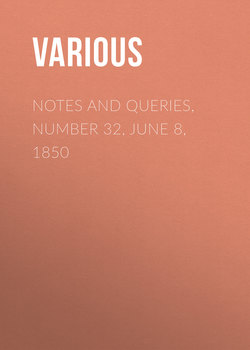Читать книгу Notes and Queries, Number 32, June 8, 1850 - Various - Страница 2
Queries
ОглавлениеPOET LAUREATES
Can any of the contributors to your most useful "NOTES AND QUERIES" favour me with the title of any work which gives an account of the origin, office, emoluments, and privileges of Poet Laureate. Selden, in his Titles of Honour (Works, vol. iii. p. 451.), shows the Counts Palatine had the right of conferring the dignity claimed by the German Emperors. The first payment I am aware of is to Master Henry de Abrinces, the Versifier (I suppose Poet Laureate), who received 6d. a day,—4l. 7s., as will be seen in the Issue Roll of Thomas de Brantingham, edited by Frederick Devon.
Warton (History of English Poetry, vol. ii. p. 129.) gives no further information, and is the author generally quoted; but the particular matter sought for is wanting.
The first patent, according to the Encyclopædia Metropolitana, article "Laureate," is stated, as regards the existing office, to date from 5th Charles I., 1630; and assigns as the annual gratuity 100l., and a tierce of Spanish Canary wine out of the royal cellars.
Prior to this, the emoluments appear uncertain, as will be seen by Gifford's statement relative to the amount paid to B. Jonson, vol. i. cxi.:—
"Hitherto the Laureateship appears to have been a mere trifle, adopted at pleasure by those who were employed to write for the court, but conveying no privileges, and establishing no claim to a salary."
I am inclined to doubt the accuracy of the phrase "employed to write for the court." Certain it is, the question I now raise was pressed then, as it was to satisfy Ben Jonson's want of information Selden wrote on the subject in his Titles of Honour.
These emoluments, rights, and privileges have been matters of Laureate dispute, even to the days of Southey. In volume iv. of his correspondence, many hints of this will be found; e.g., at page 310., with reference to Gifford's statement, and "my proper rights."
The Abbé Resnel says,—"L'illustre Dryden l'a porté comme Poète du Roy," which rather reduces its academic dignity; and adds, "Le Sieur Cyber, comédien de profession, est actuellement en possession du titre de Poète Lauréate, et qu'il jouit en même tems de deux cens livres sterling de pension, à la charge de présenter tous les ans, deux pièces de vers à la famille royale."
I am afraid, however, the Abbé drew upon his imagination for the amount of the salary; and that he would find the people were never so hostile to the court as to sanction so heavy an infliction upon the royal family, as they would have met with from the quit-rent ode, the peppercorn of praise paid by Elkanah Settle, Cibber, or H.J. Pye.
The Abbé, however, is not so amusing in his mistake (if mistaken) relative to this point, as I find another foreign author has been upon two Poet Laureates, Dryden and Settle. Vincenzo Lancetti, in his Pseudonimia Milano, 1836, tells us:—
"Anche la durezza di alcuni cognomi ha più volte consigliato un raddolcimento, che li rendesse più facili a pronunziarsi. Percio Macloughlin divenne Macklin; Machloch, Mallet; ed Elkana Settle fu poi – John Dryden!"
—a metamorphose greater, I suspect, than any to be found in Ovid, and a transmigration of soul far beyond those imagined by the philosophers of the East.
S.H.
Athenæum.
